Prashant Bhushan: India lawyer fined one rupee for tweets
- Published
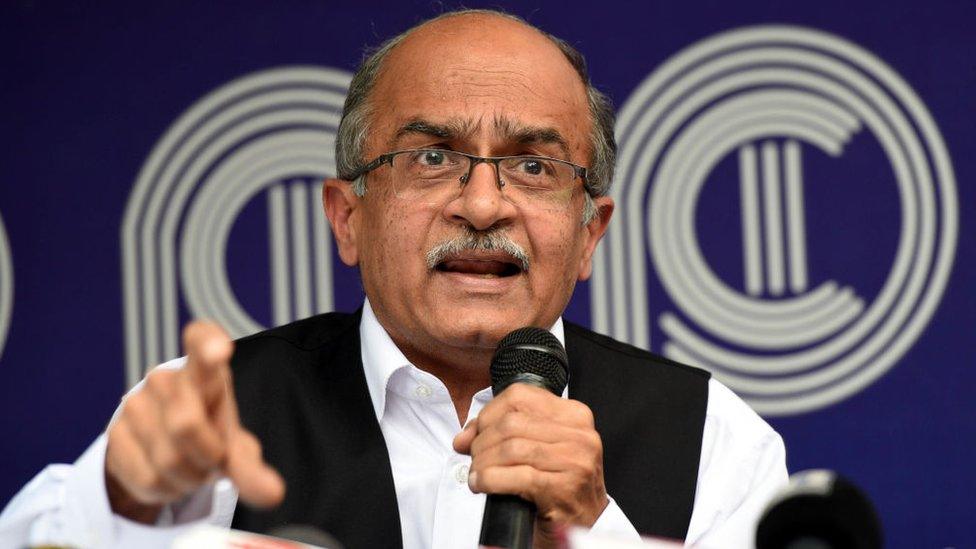
A prominent Indian lawyer and civil rights activist has been asked to pay a symbolic fine of one rupee after being found guilty of contempt of court.
The Supreme Court took action against Prashant Bhushan, 63, for posting two tweets that it found derogatory.
The court sought an unconditional apology, external from Mr Bhushan but he refused, saying he believed in what he tweeted.
Mr Bhushan has said the right to free speech includes the right to criticise members of the judiciary.
The court has said that if he failed to pay the fine, which amounts to less than a dollar, by 15 September he will be sentenced to three months in prison.
Mr Bhushan has said he will "respectfully pay the fine", but added that he still retains the right to challenge the order and seek judicial review.
The court found Mr Bhushan guilty on 14 August, but reserved sentencing for a later date as pressure mounted.
Nearly 3,000 retired judges, lawyers and eminent citizens questioned Mr Bhushan's conviction, and said holding Mr Bhushan guilty of contempt had a "chilling effect on people expressing critical views on functioning of the top court".
The reactions to the sentencing span a range of opinions, given that the case has polarised Indians on and off social media. While some have welcomed the fine as a necessary punishment, others said it is, in fact, a win for Mr Bhushan who faced the prospect of jail time.
Who is Prashant Bhushan?
Mr Bhushan is one of India's most-respected public interest lawyers and an outspoken human rights activist.
He has been practising at the Supreme Court and Delhi High court for the past three decades.
"I have consistently taken up many issues of public interest concerning the health of our democracy and its institutions and in particular the functioning of our judiciary and especially its accountability," Mr Bhushan told the top court in a recent affidavit.
Since 1991, he has been involved in a campaign for judicial accountability to "generate public opinion for putting in place credible legal institutions and mechanisms that ensure that the judiciary functions in a more transparent and accountable manner".
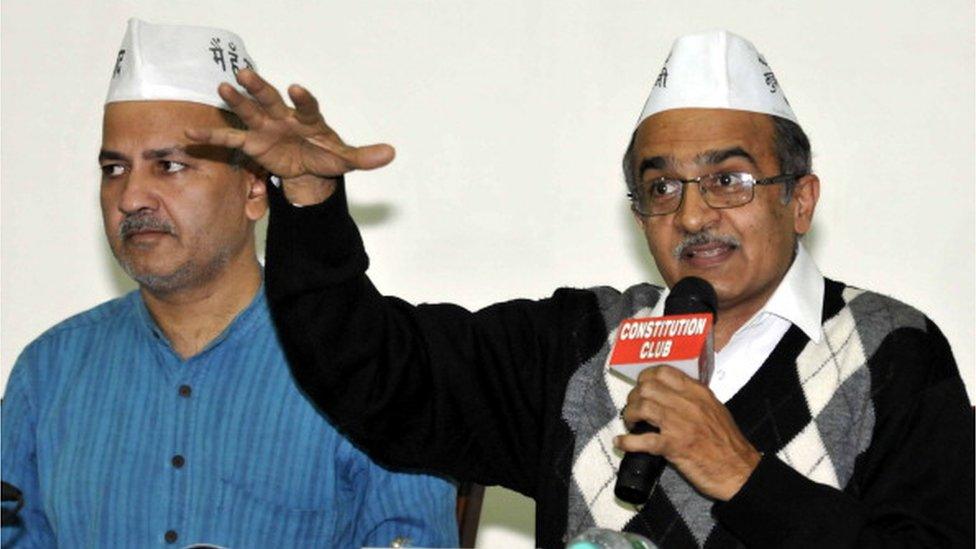
Mr Bhushan was one of the co-founders of the Aam Aadmi Party
The tireless lawyer has fought hundreds of cases relating to government corruption, environment, transparency in courts, and a range of human rights issues.
Mr Bhushan was a founder member of the anti-corruption AAP (Aam Aadmi Party), which now rules Delhi. He was removed in 2015 for what the party said was "gross indiscipline and anti-party activities". Mr Bhushan later co-founded Swaraj Abhiyan, a socio-political organisation.
With 1.6 million followers, Mr Bhushan is prolific on Twitter. "Do and say what is just and fair and in public interest, regardless of immediate fallout," says his bio on the social media platform.
What was the case against Mr Bhushan?
Mr Bhushan posted two tweets in June.
While one referred to a picture of Chief Justice Sharad Bobde sitting on an expensive motorcycle, the other alluded to the conduct of four previous chief justices in the past six years.
In July, the top court on its own authority began contempt of court proceedings against Mr Bhushan, saying the tweets were "capable of undermining the dignity and authority", external of the Supreme Court.
What was the court's verdict?
On 14 August, three judges ruled that the tweets had undermined the authority of the court.
In a 108-page-long judgement, external, they described the tweets as "a malicious, scurrilous, calculated attack on the very foundation of the institution of the judiciary and thereby damaging the very foundation of the democracy".
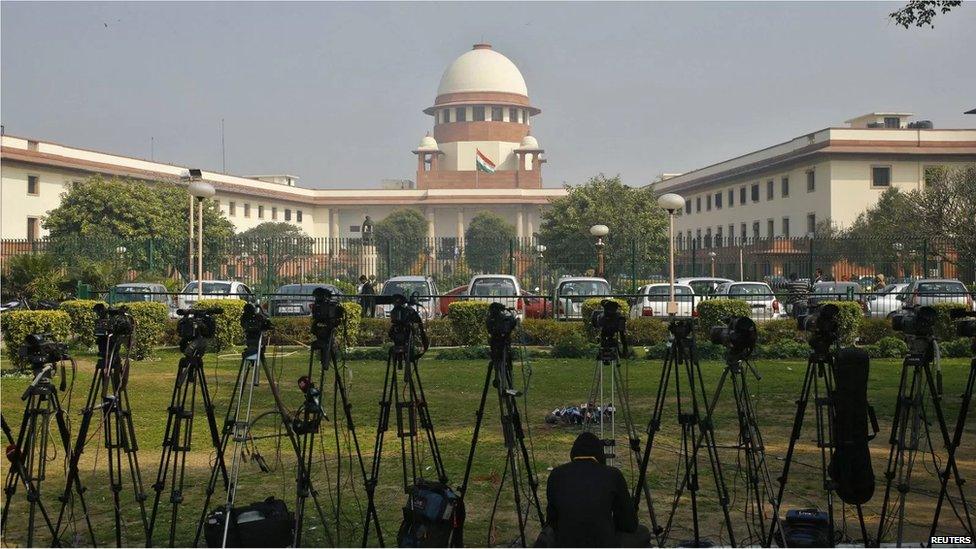
India's Supreme Court is one of the most powerful in the world
Separately, the Supreme Court has also decided to begin the final hearings of a separate 11-year-old contempt case , externalagainst Mr Bhushan.
The 2009 case concerns remarks the lawyer made in a news magazine on corruption in the judiciary.
India's Supreme Court is the final court of appeal, has constitutional powers and is a significant public institution. With 34 judges and tens of thousands of pending cases, it is also one of the busiest courts in the world.
What did Mr Bhushan say in his defence?
Mr Bhushan told the BBC that the court's orders on contempt had been "scattered and contradictory" in the past, often sparing influential people.
In an exhaustive 142-page defence, external submitted before the court, he defended his tweets, saying that the "signs of democracy being in danger have been pointed out by no less than the judges of the Supreme Court itself".
On 20 August, at a hearing where he was to be sentenced, the judges asked Mr Bhushan to tender an unconditional apology, but he refused.
"I do not seek and ask for mercy. I do not appeal for magnanimity. I cheerfully submit to any punishment the court may impose," he said, quoting India's independence leader Mahatma Gandhi.
Mr Bhushan's lawyer Rajeev Dhavan told the court on Tuesday that "an apology cannot be coerced" and client's tweets were not "scurrilous".
In his defence, Mr Bhushan also alluded to an unprecedented press conference by the four most senior Supreme Court judges in 2018.
The judges told reporters that the then chief justice Dipak Misra was ignoring rules and assigning cases according to his own preferences. They warned that democracy was under threat because of the way the court was being run.
What was the reaction to Mr Bhushan's conviction?
The conviction has led to a firestorm of protests with nearly 3,000 people, including India's top lawyers, a dozen retired judges and eminent citizens criticising the judgement.
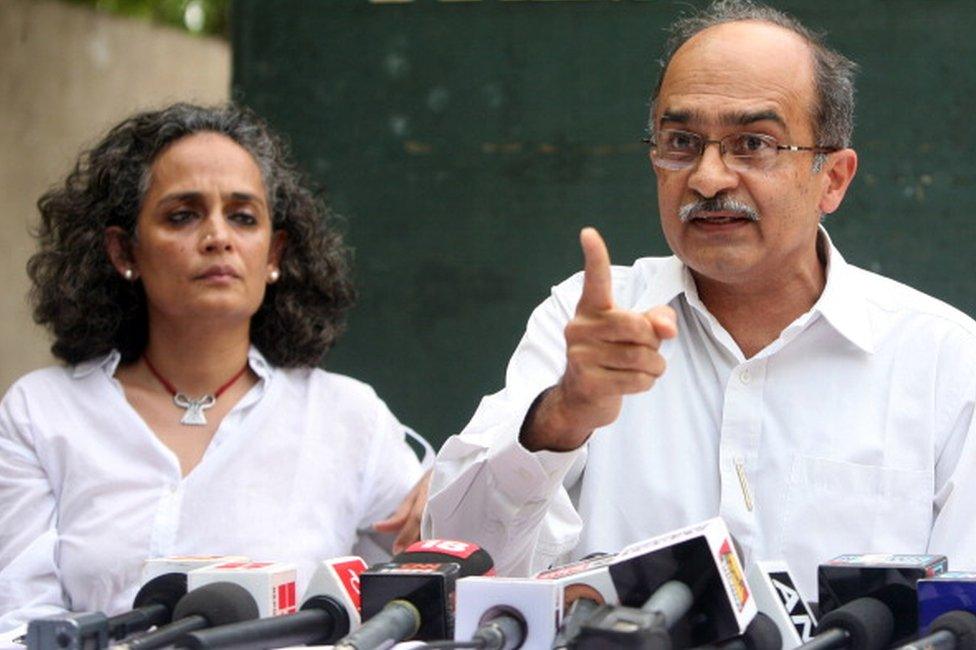
Booker prize-winning author Arundhati Roy (left) also served a day in prison for contempt of court
"Stifling of criticism by stakeholders does not bode well, external for any institution, especially the highest court in the country," they said in a statement.
A senior Supreme Court lawyer, Arvind Datar, said the judgement was "seriously flawed", external and it should be recalled.
Mr Datar pointed to a procedural violation in accepting a petition containing the complaint against Mr Bhushan. He said the court had also completely failed to "consider the contentions" raised by Mr Bhushan in his reply to the allegations.
Mr Bhushan told the BBC that he was not provided a copy of the original complaint by a petitioner on the basis of which the court initiated action against him.
"They also did not consider my detailed response at all. Less than a month from initiating proceedings they came to a verdict," he said.
What does India's contempt of court law say?
India has some of the world's strictest contempt of the court laws.
A person can be held guilty of contempt if he or she "scandalises or tends to scandalise or lowers the authority of any court, interferes with judicial proceedings or obstructs the administration of justice".
Faizan Mustafa, a professor of law, says the law is problematic because "judge himself acts as prosecutor and victim, and starts with the presumption of guilt rather than innocence".
In 2017, Mr Bhushan himself had once supported the conviction of a judge for criminal contempt of court.
Judge Chinnaswamy Swaminathan Karnan of the Calcutta High Court was sentenced to six months in prison after he was found guilty of writing letters and making allegations against fellow judges.
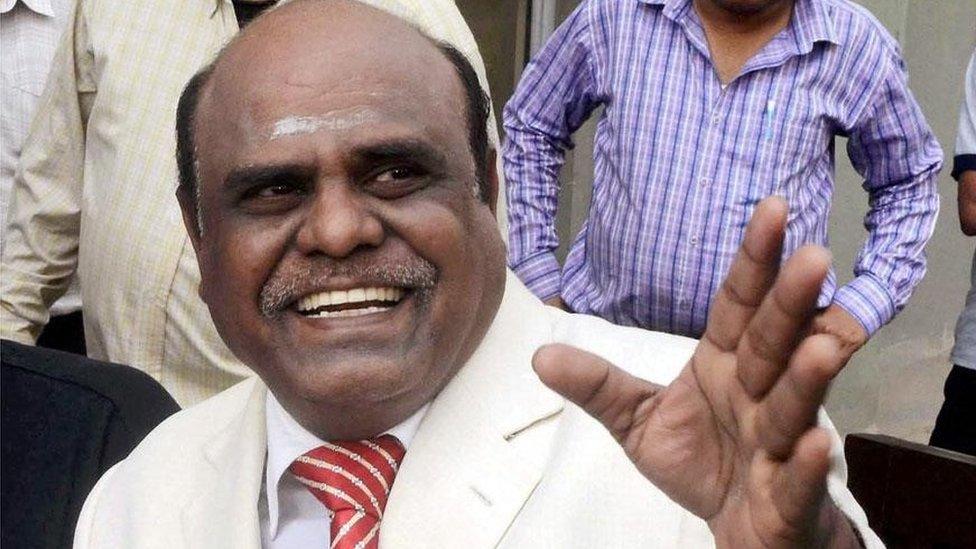
Justice CS Karnan was stripped of his powers and jailed by the top court for contempt
It was the first time in India's judicial history that a high court judge had been jailed for contempt.
Mr Bhushan told the BBC that he had supported Judge Karnan's conviction because it was a "different case".
"He was passing judicial orders without jurisdiction, summoning judges. It was a case of actually interfering in the administration of justice," he said.
In 2002, Booker prize-winning author, Arundhati Roy, served a symbolic one-day prison term , externaland paid a small fine after being found guilty of contempt of court.
The Supreme Court order against the author was in connection with her remarks about a legal decision to allow work on the controversial Narmada Dam project.
- Published3 May 2017
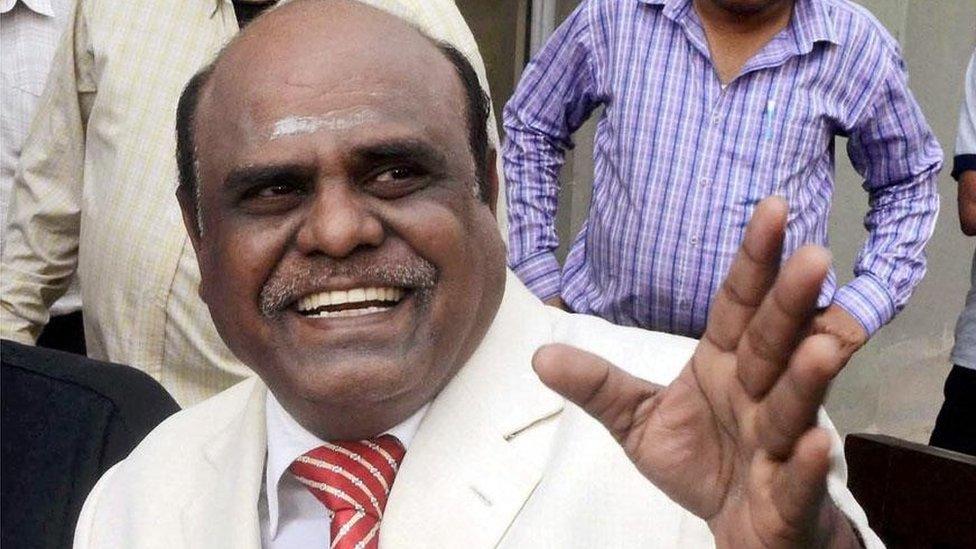
- Published17 November 2017